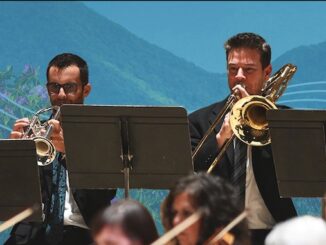The Canadian Opera Company could not have picked a better opera to kick off its mainstage return after a two-year, COVID-induced hiatus. Giuseppe Verdi’s 1853 masterpiece La Traviata is, in a word, perfect.

La Traviata has everything the form requires: lovely music, catchy music, a compelling and emotionally engaging story, and – because this is opera – a perfectly imperfect heroine. Traviata‘s Violetta Valéry is one of the greatest soprano roles ever written, gifted with extraordinarily beautiful music – both in solo arias and in Traviata‘s highly regarded duet and ensemble sections – and in the complexity of the character. Indeed, the Violetta of La Traviata, with its libretto by Verdi collaborator Francesco Maria Piave, is a far more interesting, three-dimensional character than the Marguerite of Alexandre Dumas Fils’s original novel, La Dame aux Camélias. Where Dumas’s Marguerite is a pathetic figure, a courtesan “redeemed” by the “love of a good man”, Traviata’s Violetta is a stronger character, a woman with agency and control over her own fate. Of course, it helps that she’s guided throughout by a sublime score from musical genius Verdi, at the height of his talent.
Clocking in at under three hours, and with a greatest hits’ worth of memorable tunes, La Traviata is also one of the most accessible operas ever written, and a surefire win for all the opera agnostics in your life.
In 2015, the COC surprised Toronto audiences with a thoroughly traditional and universally well received production of La Traviata, period costumes and all. In an era when too many opera companies rely on cheap gimmicks and barren “futurist” sets, director Arin Arbus’s La Traviata was a refreshingly respectful adaptation of the beloved opera. Mercifully, COC has seen fit to stick with what works, reviving the Arbus production for this first post-lockdown performance of the new, truncated opera season.
La Traviata has just about the most opera plot that ever opera’d. Violetta, a refined Parisian courtesan, finds her enjoyably superficial existence upended with the arrival of young suitor Alfredo Germont, who surpises Violetta with genuine ardour and, more worryingly, the prospect of real love. Should Violetta forsake a life of lavish parties and champagne fountains – La Traviata’s brindisi (drinking song) is one of the most famous tunes in the repertoire – for the sake of her heart, and what would be the consequences for doing so?
Returning Verdiites will know what happens next, but it’s not a spoiler to say that Violetta and Alfredo’s journey together (and apart) is alternatingly joyous, pathetic, romantic, cruel, and deeply, soul-stirringly painful. While Traviata is really about the relationship between two people, it also ropes in key figures from Violetta/Alfredo’s circle – notably Alfredo’s father, the imposing baritone role of Giorgio Germont – for its timeless meditation on love and sacrifice.
La Traviata begins with one of Verdi’s greatest overtures (the word “greatest” appears often in this article; with apologies for the repetition, no other superlative does Traviata justice), the fine, lyrical pianississimo of the violins hinting at Violetta’s beautiful but – listen closely – troubled soul. As the overture closes, we join Violetta as she delights in a champagne-fuelled party bankrolled by a wealthy admirer. One way you can tell Traviata is a masterpiece? It takes less than ten minutes to arrive at its most famous aria, the aforementioned drinking song – and it’s not even the best aria in the opening act. That honour goes to Violetta’s Sempre libera (“always free”), in which Violetta, shortly after encountering Alfredo, resolves herself to deny his love and to live and love freely, only for Alfredo’s declarations of love to float back to her as if in a dream (in fact, the tenor singing from offstage). Watching her grapple with this emotional turmoil can be heartrending, no matter how many times you’ve seen different sopranos struggle with these same questions and, every time, come to the same answers.
I’m one of those who strongly believe that no work of art, no matter how classic, deserves to be spoiled for the uninitiated. I will never tell a Shakespeare novice how any of the plays end, and by the same token I refuse to betray too much of what La Traviata has to offer. That said, it’s impossible to talk Traviata without highlighting some of the moments that make it special. Top of that list is the Act II confrontation between Violetta and the elder Germont, in which competing soprano and baritone lines resolve beautifully, even if, narratively, no such easy resolution is in the cards. Later, the conclusion of Act II will similarly resolve into some of the most sublime harmonies ever written, the three principals joined by an onlooking chorus in an extraordinary climax made more poignant by the narrative discord between the characters. (Amidst all the wondrous music, the conclusion of Act II may well feature one of the cruellest deeds by any opera protagonist.) Act III, which mirrors Traviata‘s opening in fascinating ways that become more apparent on a second, third, or fiftieth viewing (I’m probably at my tenth or so), is perfect and should be experienced with as little foreknowledge as possible.
I really cannot recommend La Traviata enough. It’s my favourite opera, it’s the one I deploy when introducing friends to the medium (I own several versions on DVD), and it’s essential viewing for anyone with even a passing interest in classical music. The COC’s admirably traditional production, featuring opera stars Amina Edris (Violetta), Matthew Polenzani (Alfredo), and Simone Piazzola (Germont), is on now until May 20, 2022.
Tickets for La Traviata can be purchased here.



